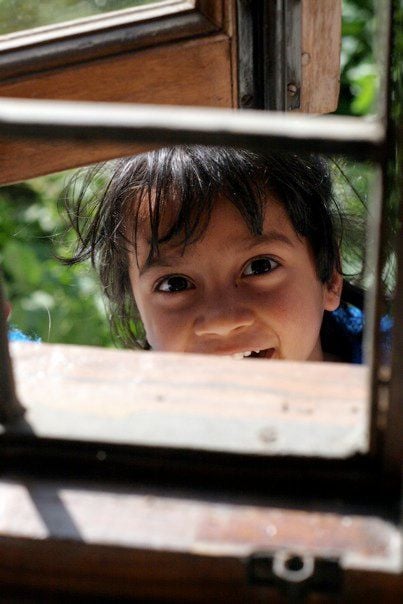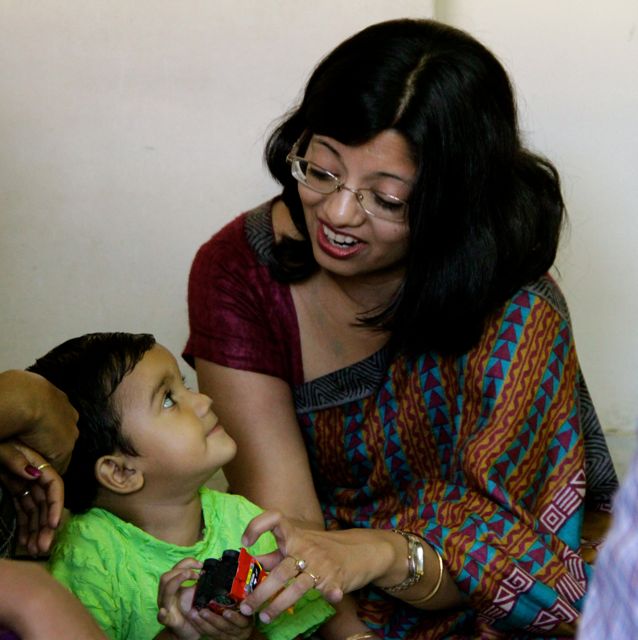How do I know what I think until I see what I say?
I am reading “Far From The Tree” by Andrew Solomon and it is a slow, painful process which is leaving me alternately breathless and buoyant. I feel as if I have been put through a threshing machine at one moment; lifted up on eagles’ wings and sent soaring into an entirely different universe the next.
This is an amazing, amazing book. It is about children who are so different from their parents as to be almost unrecognizable to them in some fundamental way yet who, by the strange alchemies of parenthood and nurture, become everything and more to them. Straight parents whose children are gay. Ordinary sized parents whose children are dwarves. Law-abiding parents whose children commit horrific crimes. Bright, high-achieving parents whose children have disabilities.
Ravi and I are in the last category; our darling daughter Moy Moy put us here. And that fact has catapulted us into a universe no one wants to belong to; a universe in which people you have nothing to do with feel qualified to pronounce on the quality of your life, and the life of the child who is precious to you.
Let’s start with the poem “Taking The Train” by Elaine Fowler Palencia:
Someone says things will be better for him
In the mountains
So we board the morning train,
Hoping to reach the bright, whitewashed city
In the blaze of afternoon.
I have everything he will need:
Magazines with pretty pictures,
The Christmas candy he wants all year,
His water bottle and specially shaped spoon.
Quiet and happy, my son dozes.
His half-grown chest rises and falls
In silent hosannas, his breath bubbles
Milky as a newborn calf’s.
The train bores through rock and scrub oak
For hours until suddenly, off to the right,
Glints the fierce splintered eye of the ocean.
This is not the way to the mountains
And why is everyone speaking Spanish?
I knew Spanish once
A uniformed official mimes his need
To punch our tickets, but
My purse only contains two maps
Of coastal Texas.
The official stops the train. Something must be done with us.
A tall station of polished mahogany
Looms in the green shade of palms.
In our coach, three seats have vanished.
Where they stood, sand dusts the floor.
I must find my suitcase.
In it are knives, and a camera
To record what is happening to us.
The row of seats in front of us
Vanishes.
The row of seats behind us
Is gone too, all its people gone.
The sand whispers higher, to my ankles.
I find my suitcase in the next car,
Catches sprung, knife blades crumbled to rust.
The camera full of sand.
Only five seats remain.
In our two, another dark-haired woman
Tucks a blanket about the knees
Of another retarded boy.
I recall a Spanish phrase:
Donde esta mi hijo?
A young woman answers:
They put him off the train.
The train is moving again, fast.
The sand in the coach has climbed to my knees.
Outside, a desert stretches to the horizon.
Somewhere along the endless dunes
My son crawls alone,
Without even his walker.
Every morning of our lives
We board this train
And ride to the point of our separation.
My heart thudded as I read this. My breath came in short gasps. I tried to stop reading, but I could not. I read it once, shuddered, turned away, then read it again. It is my darkest nightmare, my most unbearable fear. It never, ever goes away.
Because there are people out there – and we meet them every day as we take our evening walk – who do not understand that Moy Moy is a person, that her life has value, that she is cherished and that there are people who would do anything to protect her.
The Final Solution began with children with special needs: “Life Unworthy of Life,” is how the Third Reich put it – and everything else followed.
And though we know it could never happen again – because we have been there and we have seen that – we also know it could happen again tomorrow. Indeed, in some parts of the world, it is happening today.
“Far From The Tree” is a difficult book to read. Indeed, the chapter called Disability took me over ten days to get through, though Solomon is compulsively readable and always engaging. I had to keep stopping to pull myself together.
A friend had sent me the book as a gift. It arrived in my office and I kept it there because it is so fat and heavy I found it difficult to carry home (I walk to work). Sitting in my office, I kept picking it up and leafing through it. The Disability chapter, of course, had my name on it and no matter how I tried to avoid it, it pulled me in again and again.
Solomon has a gift for interviewing. The parents he spoke with are ALL profound. Eve, mother of Alix, a child like Moy Moy, says: “No one understands what it’s like; even I know what it’s like right now, and that’s all. When you came to interview us, I thought, ‘Well, I’m very happy to talk to you as long as you promise not to ask about the past or the future, because the present is the only thing I’ve got down.'”
Their insights are startling and stunning (“I cannot live with her and I cannot live without her.” “The idea of help was as overwhelming as the things we needed help with.”) and, as a parent myself, I know that kind of stuff is there for sure, but it needs to be teased out.
I wish Andrew Solomon would interview me. I have these fleeting glimpses of profound truths as I look after Moy Moy (23 years now!), but they get lost in the endless rounds of diapers and tube-feeds; of seizures and boredom; of pulled muscles and creaky wheelchairs: they get lost in our two hopelessly, blessedly, inter-twined lives. I have a feeling that Andrew Solomon would help me make sense of it all, that he would create the white space, the quiet pool, the little mountain I need to see it in relief. He is an odd duck himself and I like that about him because we are all odd ducks, one way or another.
I am not done with this book, not by a long, long shot. I did not mean to get so wrapped up in it; I did not mean to let it catch me by the heartstrings and refuse to let me go. I didn’t mean to have this life either. It caught me and entangled me and now it will not let me go. I love this book for its honesty and clarity and for the profound truths it expresses.
I am still working up the courage to read the rest of it.




I shall muster the courage to read it…..Have you read”Does He know a mother’s heart?” By Arun Shorie?I went through similar feelings while reading it….
Dear Jo, this is one of my most favourite books. It is a little heavy at times (in terms of research and content, not emotions) but I think it takes such a compassionate yet courageous look at what it is to be a parent of a child who is different. I had thought of you when I started reading it (if you remember I had mentioned that to you too).
Love
Shelja